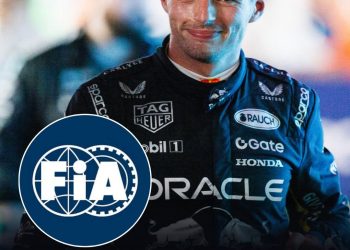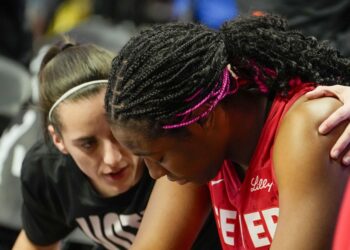Formula 1 officials have instituted a new regulation known as the “Martin Brundle Clause”, following an uncomfortable on-air exchange involving the Sky Sports presenter during the United States Grand Prix. The rule emerged as a direct response to a now-infamous gridwalk incident that captured global attention, redefining how celebrities and media interact on the F1 grid. Brundle’s trademark gridwalks, a staple of race-day coverage, have long been beloved for their spontaneity and humor, though not without their share of awkward encounters.
The United States Grand Prix, hosted at the Circuit of the Americas in Texas, typically draws a high-profile roster of guests. During these pre-race walks, Brundle attempts impromptu interviews with celebrities in attendance—some more receptive than others. Over the years, stars like Kylian Mbappé, Cara Delevingne, and Ozzy Osbourne have made his live interviews memorable, but one exchange in 2021 with American rapper Megan Thee Stallion proved particularly controversial and ultimately sparked policy change within Formula 1.
During that encounter, Brundle approached Megan with a lighthearted question about whether she might have a rap about F1. Before she could respond, one of her security guards intervened, attempting to block the broadcaster from engaging her. Though the rapper signaled she was open to the brief exchange, another member of her entourage curtly told Brundle, “You can’t do this.” The veteran commentator’s sharp retort—“I can do that because I did”—instantly went viral, igniting debates about celebrity etiquette on live television.
In the aftermath, Formula 1 executives deemed the incident a disruption to the gridwalk experience and introduced a formal rule barring celebrities from bringing personal security to the grid. This policy ensures a more open, accessible atmosphere during live pre-race coverage, allowing broadcasters like Brundle to engage freely without interference. An F1 spokesperson later confirmed that bodyguards are “no longer permitted” to accompany public figures during grid access.
Reflecting on the rule, Brundle wryly acknowledged it during a later broadcast, calling it “the Brundle Clause.” He remarked with characteristic humor that while he appreciates when celebrities interact, he doesn’t mind being ignored either. The clause has since become a symbolic measure within F1’s media framework—one that underscores the balance between access, professionalism, and the sport’s evolving relationship with global celebrity culture.










